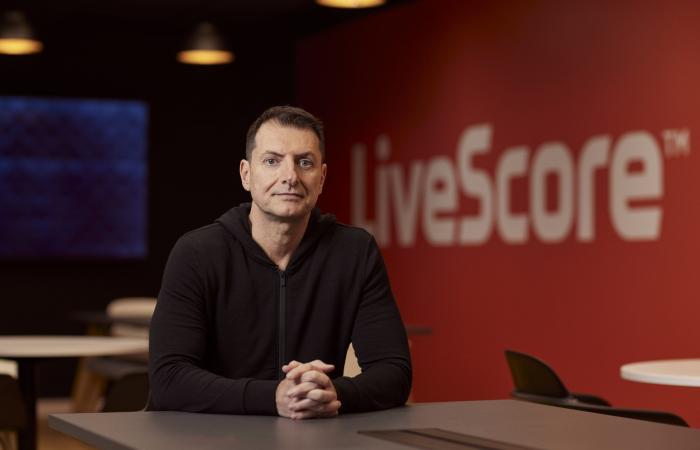LiveScore Group chief executive Sam Sadi says the business may turn to generative AI to satisfy sports fans’ insatiable demand for content and admits the operator would not have entered the Dutch igaming market today.
“Betting has moved towards the recreational, socially acceptable way to consume sports,” Sadi tells iGB. “Maybe 10 years ago, people would be betting on one or two types of markets, the winner market or number of goals.
“Now we see a wider distribution of bets into more entertainment-like products [such as] bet builders and SGPs (same game parlays), as [users consume] different types of statistics. People follow the sports in a much deeper way than they used to.”
With this evolution of betting behaviours, users have developed an almost insatiable demand for content Sadi explains. “Producing this, almost to individual needs, is expensive to be able to deliver at scale.”
Like others, LiveScore sees generative AI as a solution to satisfying that consumer demand.
Can generative AI drive convergence?
Its media offering has a global reach and its performance in different markets helps dictate its betting product’s expansion. Sadi believes his 25 years of experience in sports media has provided a key competitive advantage for the convergence of media and betting. “It’s created a moat so others are not able to enter,” he says.
“How do we customise our app more to [suit] an individual’s behaviour? And how do we deliver a single personalised app to every fan around the world? I think we’re not too far away from being able to do that at scale with the use of genAI.”
Delivering that personalised experience to users is crucial in bridging the gap between media and betting. Although separate product and marketing teams work across the two product arms, Sadi says the the product suite is viewed as a single ecosystem to ensure a seamless experience.

The impact of overregulation
Currently LiveScore Bet is available in the UK, Ireland, Nigeria and the Netherlands. Sadi is eyeing expansion into South Africa and Eastern Europe, but its growth in new markets has slowed since 2022 and the cost implications of overregulation could further delay its expansion.
LiveScore Bet was among the first to enter the Netherlands’ licensed online gambling market in September 2021. However tightening regulations on advertising and tax hikes have created an increasingly onerous burden for licensees.
The LiveScore CEO admits he may not have entered the market under its current regulatory regime. “Single-digit market share owner operators are on the brink of being exited from the market due to regulation” he says. Each additional layer of compliance brings its own additional costs and Sadi believes the current business model is becoming too expensive for mid-tier operators to navigate.
“Making decisions to enter a market rely on complex models towards investment and, at some point, reaching profitability. If the fundamentals change over time, you need to revisit and refinance your business and question whether there is long-term viability in the market,” Sadi says.
“The most damaging regulatory environment is one that is full of uncertainty.
Sam Sadi, LiveScore Group CEO
“The most damaging regulatory environment is one that is full of uncertainty. Making decisions to enter a market rely on complex models towards investment and at some point, reaching profitability.”
Thanks in part to the success of the LiveScore media business in Africa, Sadi has set his sights on expanding its betting operations on the continent. Africa’s “advanced and sophisticated” regulatory landscape strikes a good balance between consumer protection and allowing operators to grow.
South Africa – where LiveScore acquired platform specialist WonderLabz last year – is another country the company is eyeing for a future betting launch. And Sadi is also confident about opportunities in Kenya and Ghana as “well established, regulated markets”. On Nigeria he admits: “we haven’t seen than much traction, but that’s because we haven’t prioritised this market yet. As the market shifts more from retail to online, we’ll be there to leverage that opportunity.”
Competition in convergence – but will they succeed?
The rise of convergence apps clearly reflects the wider behavioural shift in players, but it’s an expensive model to operate and the industry has seen a few offerings fall by the wayside already.
Penn’s Barstool Sportsbook was a prime example. After securing a majority stake in Barstool in 2020, Penn sought to combine the online sports community with its interactive betting solution. It ultimately sold the business back to founder Dave Portnoy in August 2023. The US gambling giant subsequently initiated a new media partnership with ESPN. That new venture experienced a slow start, leading to speculation of rival operators bidding to acquire Penn.
“Not every type of sports media has the propensity to converge,” Sadi says. “Barstool Sports is really a social community. Do people use that community in a betting context? Is that why they are on that platform? ESPN is in contrast, it’s a pure sports product.”
“[Convergence is] a term used a bit too loosely in our industry.”
Sam sadi, livescore group CEO
The LiveScore CEO says he doesn’t view similar convergence products as direct competition. “It’s a term used a bit too loosely in our industry.”
DAZN, The Score and Fanatics are all navigating convergence in their own unique way. Indeed, Sadi says the former is targeting a slightly different audience to LiveScore and he believe its betting offering is supplementary to their media capabilities.
“We don’t focus on the [other] convergence operators much. Some are different in terms of the audience they target.” Instead, the target audience is LiveScore media consumers that are betting across different apps. “We need to see if there is a way we can deliver better value to them.” This is particularly relevant in the UK’s mature and highly competitive betting landscape.
“At the receiving end of that audience you need to have a sportsbook that is just as good or better than the market leaders. Just because your audience loves your brand and spends time consuming your content, [they won’t] downgrade their sports betting experience.”







